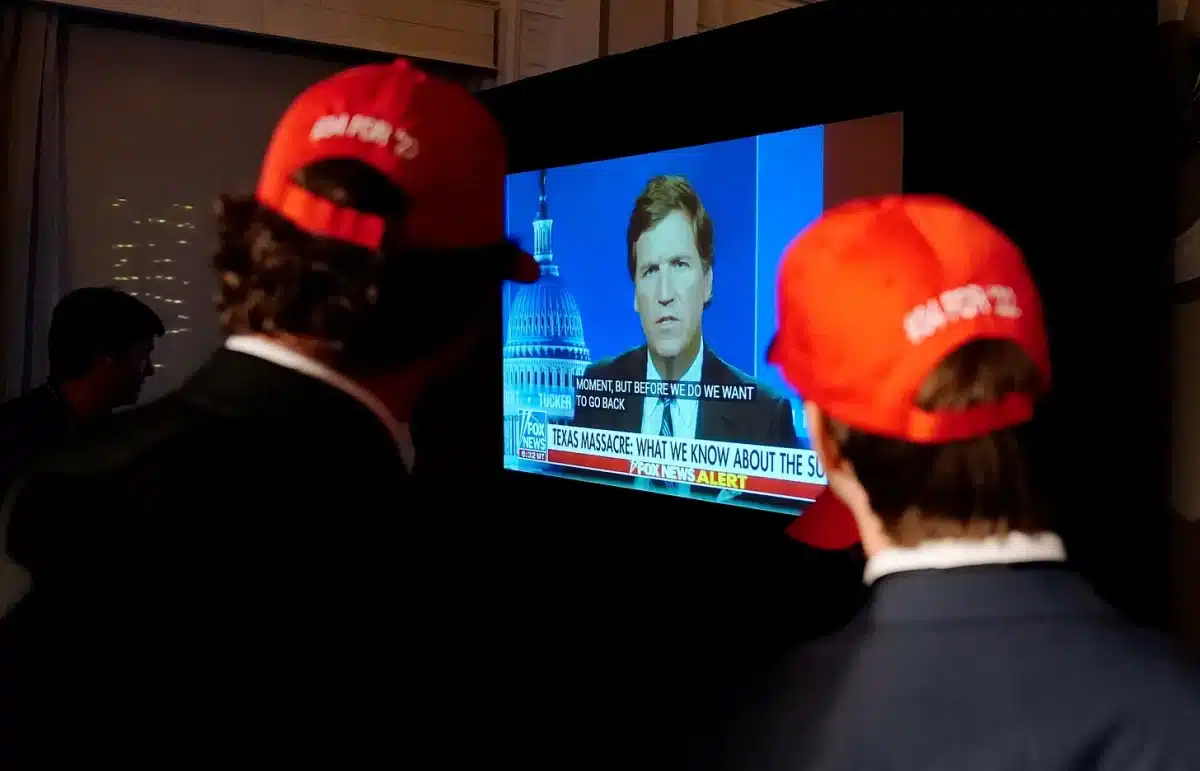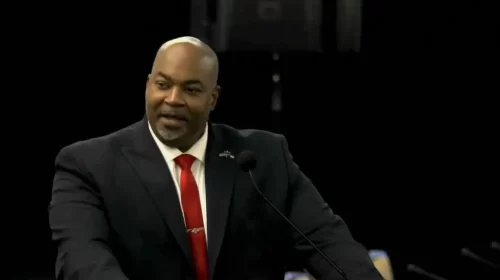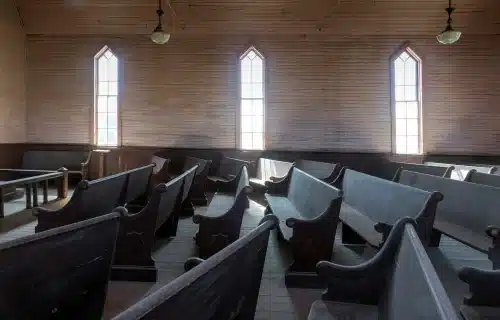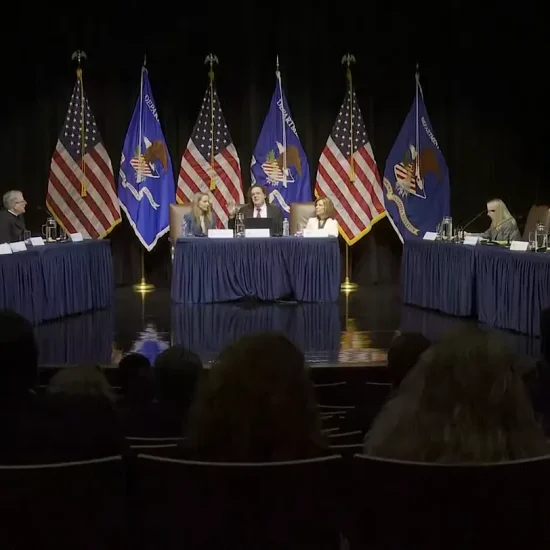
In a piece about politics poisoning evangelical churches, Rev. Ken Brown of Community Bible Church in Trenton, Michigan, lamented to The Atlantic last year that while he only had 45 minutes on Sundays to impact people in the pews, “Rush [Limbaugh] had them for three hours a day, five days a week, and Fox News had them every single night.” Another pastor told the Biblical Recorder, “For many in the church, CNN and Fox News disciple congregants more consistently than pastors and church leaders.”
Fox News star Tucker Carlson is happy to lure congregants away from their churches to teach them his gospel.
“How do you know if something is good or bad?” he declared in December during a Turning Point USA event. “As people who want to sort of try occasionally, at least on Sundays, to be decent, we should have a way of knowing whether something is good or bad. Now, traditionally I think for most Christians, it’s like, well, just ask your pastor. But then, at least as someone who grew up in a church that became pagan, I can tell you that doesn’t always work.”
“I was raised an Episcopalian, so my spiritual discernment is blunted at best,” he added. “I stayed with that church till two years ago — that’s how out of it I am. And it’s like fully a pagan enterprise now, like literally I think they’re burning calves they’ve slaughtered or something at the altar.”
But after attacking pastors in the Episcopal Church, the Fox Cathedral’s televangelist wasn’t suggesting people should necessarily find another church. Instead, they just needed to realize that something is good when it is beautiful, calming, symmetrical, creates order, and doesn’t hurt people.
And, of course, a good way to learn all of this is by attending MAGA events like those hosted by Turning Point USA (that helped fund Donald Trump’s Jan. 6, 2021, rally) or by watching the nightly TV show with the Zen master himself. Then one will learn that Trump is good with “an unbelievable life force” and “animal joy,” that Democrats are “demonic” and have been stealing elections, that COVID vaccines are bad, and that President Joe Biden is just a puppet for Barack Obama to keep running the government. Don’t ask your pastor. Just sit back and trust Carlson. And if your pastor suggests otherwise, dismiss the “pagan” and watch more Fox News.

(Brynn Anderson/Associated Press)
But this isn’t just a problem with Carlson. He uttered a common refrain at religion-infused MAGA events where speakers warn those present not to trust their pastors. Salvation and revival won’t come from local churches but from political movements and partisan speakers with a merchandise booth just outside the door.
This issue of A Public Witness raises the alarm about political attacks on the importance of the local church and the role of pastors, warns how such attacks aid the decline of U.S. Christianity, and lifts up a different vision for discipling believers.
Flaming Arrows
That Tucker Carlson took his swing at pastors during a Turning Point USA event shouldn’t be a surprise considering the group’s leader, Charlie Kirk, frequently attacks pastors who won’t push culture war politics as “cowardly.” He has claimed that just 5% of pastors in the nation are “courageous,” thus urging people to leave the rest of the congregations to join the more partisan ones.
Kirk argued at an event with James Dobson last year that Christians should leave their church if it closed down at all due to COVID. The college dropout argued that any pastor who followed public health rules doesn’t understand how to read the Bible. He even blamed declines in church attendance on pastors — apparently using popularity to judge biblical truthfulness. He argued the “courageous” churches preaching politics are increasing in attendance and tithes and thus must be right, unlike the “wokey” churches that “are closing doors.”
“I say, ‘Well, how’s your attendance been since COVID?’” Kirk said he asks pastors when they push back against him urging that they preach partisan issues. “Vast majority: ‘Well, it’s down.’ You know why it’s down? Because your congregation doesn’t respect you, that’s why.”
He listed other issues people should leave their church over if their pastor hasn’t preached about it, including attacking transgender persons and critical race theory. Insisting America is “the least racist nation ever to exist in the history of the world,” he also criticized as “an abject failure” any pastor who advocated for racial justice in the aftermath of the police killing of George Floyd. Using contemporary politics to write a new creed, Kirk claimed pastors who don’t preach accordingly are “afraid of the Bible.”
“We’re not going to put up with another pastor or ministry that doesn’t speak out against this stuff. I don’t care how nice they are. That’s the call to action,” he added.
This brashness seems frequent with the MAGA attacks on pastors. Probably no politician embodies this more than North Carolina Lieutenant Governor Mark Robinson. In November, he addressed a meeting of the National Association of Christian Lawmakers, a conservative group that espouses Christian Nationalism and pushes legislation to enact “biblical principles.”
Speaking to the group, Robinson invoked the myth of the so-called “Black Robe Regiment,” which some rightwing pundits use to claim there were preachers during the American Revolutionary War who put their battle uniforms under their clerical robes to recruit parishioners to fight. He used this bad history as a foil to attack pastors today
“They were willing to put on the entire armor of God and not be ashamed to preach the whole word of God, no matter what the consequences. But now look at today’s church,” Robinson said. “Pastors are afraid to preach the gospel. They’re afraid to stand up on stage and tell simple truths. What are some simple truths? There are only two genders.”
Robinson also criticized pastors for not using the King James Version of the Bible, arguing that even if people don’t understand it, all they need is to read it and wait for a direct message from Jesus.

Screengrab as North Carolina Lieutenant Governor Mark Robinson speaks to the National Association of Christian Lawmakers on Nov. 17, 2022.
Additionally, Robinson attacked pastors for not being able to “find a way to do their job correctly” because they “have lost sight” of the Bible and the U.S. Constitution. Wearing a lapel pin featuring a cross on top of a U.S. flag and a North Carolina flag, he preached Christian Nationalistic ideas in line with the host group. Robinson insisted politicians need to “first rely on that word of God” since “our Constitution is literally based on the word and principles of God Almighty.” Pastors who don’t thus follow both documents and support politicians who similarly push Christian Nationalistic beliefs should be rejected.
Or consider the traveling variety show of extremism known as the ReAwaken America Tour (or RAT for short). During each event in this series, speakers frequently criticize the majority of U.S. pastors for not offering the messages like those heard at RAT events. Pastors are blasted for not speaking the “truth” about the 2020 election being stolen, the danger of COVID vaccines, and how God has prophesied the return of Trump to the Oval Office.
For instance, during a RAT rally last month in Nashville, Tennessee, popular RAT speaker Stella Immanuel mixed in an attack on pastors along with her regular claims about COVID being a fake pandemic and the vaccines being dangerous — and she argues that the U.S. government is run by “reptilian” aliens and that many gynecological illnesses like cysts and infertility are caused by having sex with demons in dreams. But at the latest RAT, she argued God had given her a word ahead of the next fake pandemic, denouncing pastors who did not join the RAT movement as “wolves or the so-called ministers that are leading his people astray.”
The regular attacks on preachers might leave people wondering where to find a church to attend. But they need not worry. Instead, each RAT event features a baptism service. Who needs a local church when you can just get dunked at a political rally featuring Eric Trump, Roger Stone, and Michael Flynn?
Pastoral Headwinds
These cynical attacks on pastors come at a particularly vulnerable time. New survey data last month revealed a continued erosion of trust in clergy. According to a Gallup poll, only 34% of Americans gave pastors high or very high marks when it comes to honesty and ethics, which is an all-time low.
With fewer Americans attending church (perhaps caused in part by this decline in respect for religious leaders), many Christian congregations face a crisis. Not only are churches getting smaller, but they are also growing older. These trends were exacerbated by the COVID pandemic, with young adults less likely to return to pre-pandemic worship habits relative to others.
Political polarization is another factor sapping congregational vitality. Partisan identification has increasingly become an overriding identity, with our country sorting itself into two opposing tribes. Religious belonging is not immune from these pressures, with political beliefs influencing the faith one professes. More specifically, the effort by prominent conservatives to redefine Christianity according to a narrow political agenda has the effect of driving those who disagree politically away from the Christian faith. Good politics makes for bad evangelism.
All of this — the loss of trust in clergy, the lingering societal effects of the pandemic, the aging of congregations, and a polarized politics that alienates people from Christianity — will likely exacerbate the shuttering of church doors. Even before COVID emptied out pews, more congregations were closing than opening.

These dynamics leave pastors in a tough spot. Tasked with sustaining ministry in a context defined by older, fewer members and increasing cultural skepticism, clergy find themselves struggling to do more work with reduced resources. Facing burnout, many have quit or are reconsidering their future in ministry. Navigating new pressures from those seeking to manipulate Christians for political gain only adds to their burden.
“Media talking heads are emboldening rank and file parishioners to get their pastor on the record on issues like same-sex, abortion, Jan. 6, women in leadership, etc. Pastors don’t want to talk about that stuff. It’s a no-win situation, because they know that their congregation is more than likely divided on topics like that,” political scientist and American Baptist pastor Ryan Burge, who wrote The Nones and 20 Myths about Religion and Politics in America, told us. “But these very vocal church members (who are often some of the church’s biggest financial supporters), want to pin their pastor down.”
“I think the end result is that lots of pastors will grow weary of dancing around minefields every week and walk away,” he added.
Anecdotally, Burge’s prediction rings true. Both of us have talked to numerous ministers weighed down by impossible expectations in a difficult vocational context. They cite concerns like resistance to change among congregants, which proves costlier in a rapidly evolving world. And they describe the sense of defeat that comes with trying to lead churches and form disciples in an era when cable news is on around the clock, giving Tucker Carlson unfettered access to their members’ homes, while they only get to preach on Sundays for 15 or so minutes to parishioners who attend worship once or twice a month.
What pundits and provocateurs like Charlie Kirk realize is that a moral vacuum has emerged. With Christians increasingly turning away from their churches and pastors, they are eager to fill the gap by offering a worldview that marches under the banner of “Christian” but deeply conflicts with the actual teachings of Jesus. That awkward tension is easily resolved if their acolytes imbue partisan voices with the authority they traditionally accorded to religious leaders.
Get cutting-edge reporting and analysis like this in your inbox every week by subscribing today!
Let Pastors be Pastors
At the beginning of this year, one of us (Beau) made a transition back into full-time congregational ministry (but will continue writing some for A Public Witness). Preparing for this vocational shift involved reading a number of books on pastoral leadership, some classics and others more recent. They serve as reminders that the role and duties of a pastor are not defined by those seeking political gain but by theologians and ministers who have devoted their lives to understanding the needs of Christ’s Church.
In The Pastor as Minor Poet, M. Craig Barnes — who recently retired as president of Princeton Theological Seminary and before that enjoyed a long career in congregational ministry — draws on an underappreciated biblical metaphor to describe the ministerial calling: the poet. The Christian tradition has “major poets” who “provide enduring expressions of the deep truth of life.” Such poets are found both within the Bible and in the Church’s history. Voices whose lives and work express something of the essence of the Christian faith, like the biblical prophets, Jesus (of course), Augustine, Martin Luther King Jr., and Dorothy Day.
The role of pastors is to be “minor poets” who “inculcate that truth to particular people in particular places.” Congregational ministers apply the teachings of the major poets to those they shepherd in a particular context. In doing so, they are accountable not to a political ideology but to the core ideas and values of Christianity whose compelling truths transcend time, places, and political causes.

More recently, theologian Andrew Root has written a series of books on “ministry in a secular age.” Root argued ministry today is defined by the shift to a place where belief in God is no longer assumed but a contested idea. In this setting, we have “erased the dividing line between sacred and secular, freeing our ordinary lives from divine consequence and making us immune from pastoral prodding.”
Root’s work calls our attention to how we’ve exchanged the glory of God and the power of resurrection faith for lesser “goods” and smaller gods. The challenge for pastors is to shift their congregation’s attention back to a God who sustains, resurrects, and acts within our lives. Faithful ministry emphasizes what only God can do, rather than what humans try to use God to do.
In other words, winning a political battle is too small when the stakes are this high. The work of ministry is to witness to and participate in the reign of God, which is much larger than someone like Charlie Kirk can imagine. It has political implications because it challenges the powers that be rather than simply trying to imitate them.
“Lavish love calls the Christian heart to communion with God and commitment to all neighbors and creation. This love fills the hungry with good things and sends the rich away empty,” Rev. Adriene Thorne, senior minister of The Riverside Church in New York City, told us. “If neighbors exist in the world in ways that we would not accept for ourselves, then we have lavish loving work to do. Love looks like full bellies, affordable housing, access to health care, quality education, and a dignified existence.”
That’s really the test. When it comes to moral judgment, good pastors guide us through a narrow gate and down a costly way that confronts our shortcomings so that we can experience a richer life through deeper connection to God and others. Tucker Carlson and his ilk offer moral counsel that reinforces a social order that benefits their interests and denounces those who challenge their standing. They are offering their flock an easy path through this world but at the cost of their souls.
As a public witness,
Brian Kaylor & Beau Underwood






